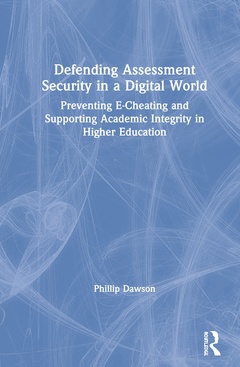Defending Assessment Security in a Digital World Preventing E-Cheating and Supporting Academic Integrity in Higher Education
Auteur : Dawson Phillip

Defending Assessment Security in a Digital World explores the phenomenon of e-cheating and identifies ways to bolster assessment to ensure that it is secured against threats posed by technology.
Taking a multi-disciplinary approach, the book develops the concept of assessment security through research from cybersecurity, game studies, artificial intelligence and surveillance studies. Throughout, there is a rigorous examination of the ways people cheat in different contexts, and the effectiveness of different approaches at stopping cheating. This evidence informs the development of standards and metrics for assessment security, and ways that assessment design can help address e-cheating. Its new concept of assessment security both complements and challenges traditional notions of academic integrity.
By focusing on proactive, principles-based approaches, the book equips educators, technologists and policymakers to address both current e-cheating as well as future threats.
1. E-Cheating 2. Assessment Security 3. The E-Cheating Lifecycle and How to Disrupt It 4. Cybersecurity, E-Cheating and Assessment Security 5. Lessons from E-Cheating in Games and Gambling 6. E-Cheating, Assessment Security and Artificial Intelligence 7. Surveillance and the Weaponization of Academic Integrity 8. Metrics and Standards for Assessment Security Chapter 9. Structuring and Designing Assessment for Security 10. Conclusion: Securing Assessment Against E-Cheating
Phillip Dawson leads research into academic integrity at the Centre for Research in Assessment and Digital Learning (CRADLE), at Deakin University in Melbourne, Australia. He uses his background in assessment and cybersecurity to protect education from cheating. His work involves unorthodox methods like computer hacking and paying professional cheaters.
Date de parution : 10-2020
15.6x23.4 cm
Date de parution : 10-2020
15.6x23.4 cm
Disponible chez l'éditeur (délai d'approvisionnement : 14 jours).
Prix indicatif 45,15 €
Ajouter au panierThème de Defending Assessment Security in a Digital World :
Mots-clés :
Phillip Dawson; assessment; cheating; e-cheating; security; online; academic integrity; cybersecurity; learning analytics; game studies; criminology; communicating; cheating services; Contract Cheating; Assessment Security; Grand Theft Auto; Van Der Vleuten; Cognitive Offloading; Remote Proctored; Assessment Security Vulnerabilities; Dialogic Feedback; Unsupervised Tests; Cheating Sites; Online Exams; Surveillance Approach; Educational Integrity; Online Gambling; Darknet Markets; In-person Examinations; USB Flash Drive; Surveillance Culture; Online Formative Tests; NVivo Qualitative Data Analysis Program; Quality Assurance Agency’s Guidance; Penetration Testing; Students Play Video Games; Assessment Design; Correct Classification Rate



